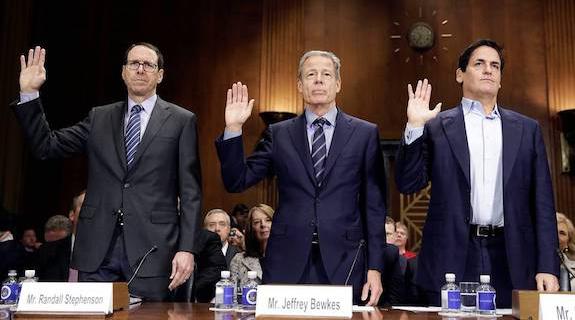With the presidential election behind them, the CEOs of AT&T and Time Warner on Wednesday testified on behalf of the two companies’ proposed $85.4 billion merger.
The three men sat in front of the Senate antitrust subcommittee, chaired by Sen. Mike Lee (R-Utah).
While the election results weren’t an explicit topic of the hearing, it was a specter looming behind the proceedings. When the merger was announced in late October, then Republican nominee Donald Trump immediately said he opposed it, saying it would put too much power in the hands of too few, but he hasn’t commented on the deal since winning.
AT&T CEO Randall Stephenson and Time Warner CEO Jeff Bewkes presented the merger, both of whom said they hadn’t yet been in contact with the incoming Trump administration about the deal— as a “bulwark against the dominance of Silicon Valley giants,” such as Google and Facebook, wrote the Wall Street Journal. The two CEOs also told the subcommittee that the merger would bring consumers lower prices for pay TV and other services.
“Together, AT&T and Time Warner will disrupt the entrenched pay-TV models, giving customers more options, creating more competition for cable TV providers and accelerating deployment of 5G wireless broadband,” Stephenson testified, according to the AP.
While the merger would involve two of the country’s largest media companies, the merger is essentially vertical. AT&T, which also owns DirecTV, is mostly a content distributor, while Time Warner is a content producers, owning such assets as HBO, Warner Bros., and Turner Broadcasting. Vertical mergers tend not to set off anti-trust alarm bells. The Department of Justice and either the Federal Communications Commission or the Federal Trade Commission will examine the deal before granting or denying it regulatory approval.
Many consumer groups oppose the deal, saying that AT&T controls many of the broadband pipelines on which nascent internet companies rely.
Subcommittee Chair Lee agreed with that, saying that the deal “could lead to potential anticompetitive favoritism,” according to the WSJ. AT&T is currently exempting its own new streaming service, DirecTV Now, from data charges it would assess competitors.
Lee also voiced concerns that the merger would lead to “price and access problems” for competitors who want to offer Time Warner content to their customers. Lee has been previously outspoken about his skepticism around Comcast’s failed attempt to acquire Time Warner Cable as well as AT&T’s earlier $50 billion acquisition of DirecTV in 2015.
Another senior Republican on the committee, Sen. Charles Grassley (R-Iowa), wondered aloud whether the merged company would “employ bullying tactics to dictate rates and terms to other networks,” wrote the WSJ.
Still, pro-business Republican senators such as Sen. Jeff Flake (R-Ariz.), Them Tillis (R-N.C.) and David Perdue (R-Ga.) “spoke positively about the deal,” the paper reported.
Separately, the House of Representatives on Wednesday introduced legislation that would lift a ban forbidding TV station owners from also owning newspapers. Incoming House Energy & Commerce Committee Chair Greg Walden (R-Ore.) and Rep. John Yarmuth (D-Ky) cited the need to have real news to counter so-called “fake news,” according to Broadcasting & Cable.
READ MORE: Wall Street Journal, TVNewscheck/AP
[Image of AT&T CEO Randall Stephenson, Time Warner CEO Jeff Bewkes and Mark Cuban courtesy of Reuters via the Wall Street Journal]
Tags:













































__twocolumncontent.jpg)











